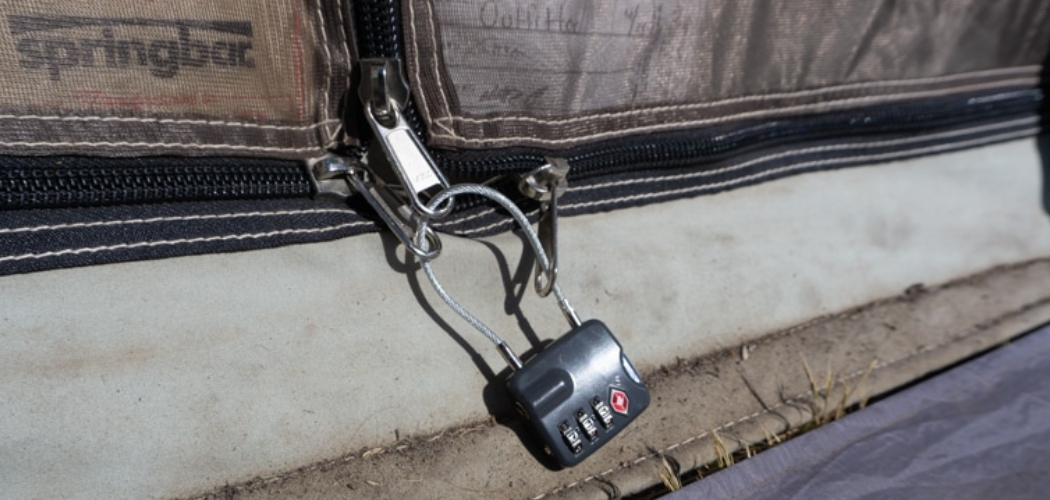Learning how to lock tent while camping is an important step in ensuring both peace of mind and the security of your belongings. Tents are your home away from home when exploring the great outdoors, offering shelter and privacy. However, most tents are made of lightweight material and equipped with zipper closures that don’t offer much resistance to intruders or curious wildlife.
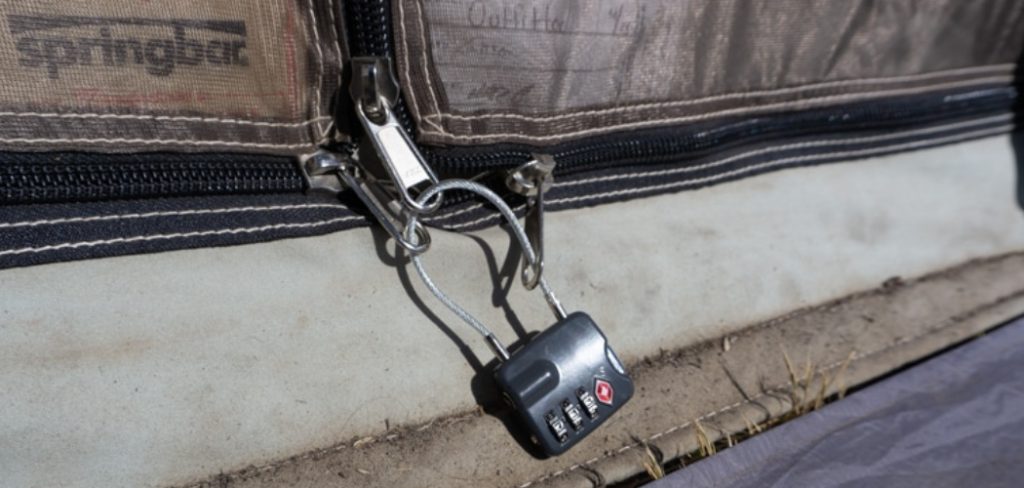
Securing your tent with the right locking techniques prevents unauthorized access and protects your valuables from theft or tampering. Whether you’re camping in a remote wilderness area or a busy campground, the process involves simple yet effective measures, such as choosing the right lock, positioning your tent wisely, and safeguarding your gear. This guide will break everything down step by step, making it easy to lock your tent and focus on the adventure ahead.
Why Is It Important to Lock Your Tent?
Understanding why you should lock your tent is key to appreciating the steps involved. One of the biggest concerns while camping, especially in public or crowded areas, is the safety of your personal belongings. A locked tent provides a higher level of security by deterring opportunistic thieves and preventing anyone from casually unzipping the tent to snoop or take something.
Apart from theft, locking your tent plays an essential role in maintaining its privacy and integrity. Unsecured tents are vulnerable to wildlife, which may enter in search of food or shelter. By locking it, you create a barrier that discourages animals from approaching or accessing the interior.
Lastly, locking your tent gives you peace of mind. Whether you’re hiking nearby or asleep inside your tent at night, knowing you’ve taken measures to protect your belongings and space allows you to enjoy your camping experience without worry. The effort you put into tent security is a small price to pay for the safety and comfort of your outdoor adventure.
Step-by-Step Guide: How to Lock Tent
Step 1: Choose the Right Lock
The first step in securing your tent is selecting a suitable lock. Not all locks are created equal, so consider options designed specifically for outdoor use. Zipper locks, typically lightweight and easy to use, are a popular choice for camping. These locks can secure zippers together, creating a basic deterrent against theft or intrusion.
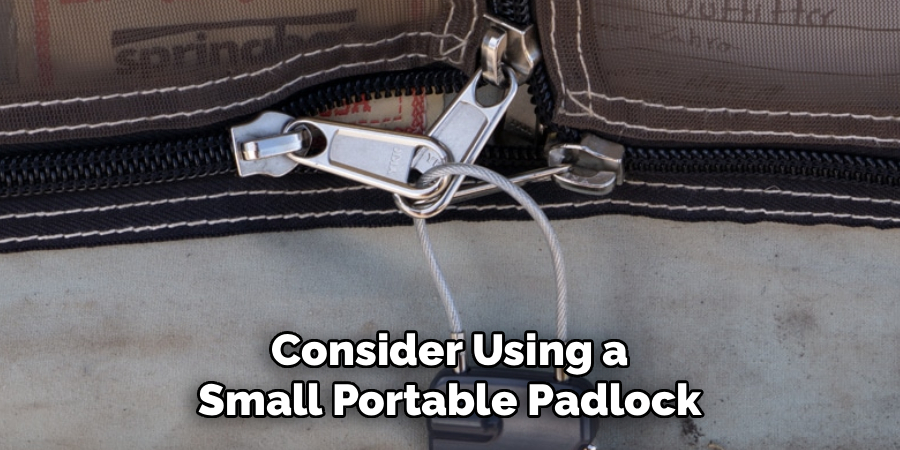
For added security, consider using a small portable padlock. Make sure the lock is weather-resistant to endure exposure to the elements. Another option is a combination lock, which eliminates the need for keys and makes locking and unlocking more convenient. Choosing the right lock is crucial because it provides the foundation for tent security, ensuring peace of mind throughout your trip.
Step 2: Secure Tent Zippers
Once you have the right lock, the next step is to secure your tent’s zippers. Most tents have two or more zipper pulls that meet when the tent is closed. Thread the lock through the zipper pulls so they stay fastened together. For combination or padlocks, ensure the mechanism is fully engaged before leaving your tent unattended.
If your tent has multiple entry points, repeat this process for each set of zippers to secure all access points. Properly locking the zippers ensures that no one can casually open the tent without first unlocking it. Securing your zippers effectively eliminates the tent’s most vulnerable entry points, providing basic protection against intrusions.
Step 3: Choose a Strategic Tent Location
The location of your tent can significantly impact its security. When setting up camp, choose an area that is well-lit and easily visible from common paths or the campground center. Visibility alone acts as a deterrent against potential thieves, as it reduces the opportunity for someone to approach the tent unnoticed.
Additionally, placing your tent near others can provide a sense of community security. Fellow campers often serve as unwitting guardians, making it more challenging for someone to tamper with your tent. Selecting a strategic location minimizes risks and reinforces the effectiveness of your locking measures.
Step 4: Store Valuables Wisely
Securing your tent is only one part of the equation—where and how you store your belongings inside matters, too. Keep valuable items like wallets, keys, and electronics tucked away in a portable safe or lockbox, ideally positioned under sleeping bags or in other inconspicuous spots.
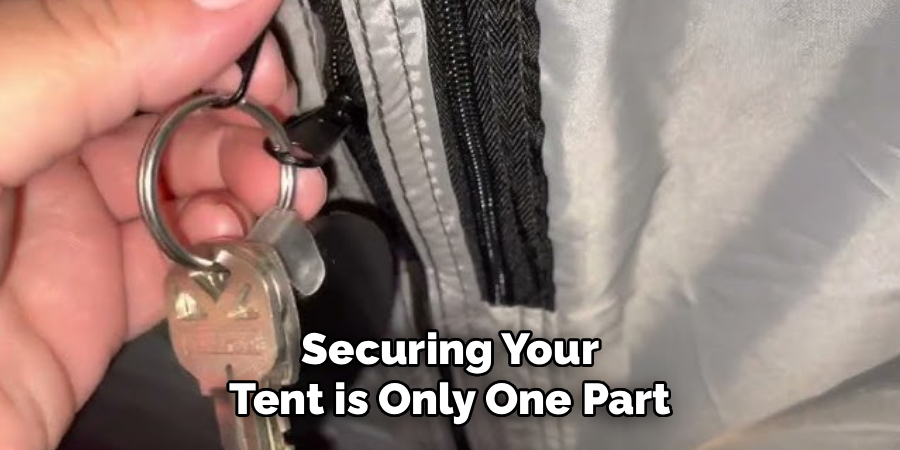
Avoid leaving valuables near the entrance or in plain view, as this could attract unwanted attention. If possible, consider using backpacks or storage bags with built-in locking mechanisms for an added layer of security. Storing your valuables properly within your locked tent protects you from loss and contributes to overall peace of mind.
Step 5: Use Additional Security Accessories
To further enhance your tent’s security, consider using additional accessories. Travel alarms are compact and easy to set up—they emit a loud noise if triggered by movement or tampering. Similarly, anchoring the tent to the ground with reinforced stakes or cables provides extra stability and makes it harder for anyone to tamper with it.
If camping in an area prone to wildlife visits, using scents or deterrents near the perimeter can discourage animals. Combining these accessories with a locked tent ensures maximum security and a restful camping experience.
Step 6: Test Your Setup
Before leaving your tent unattended or settling in for the night, always test your security setup. Try gently pulling on the zippers to confirm that the lock is holding them securely in place. Check all access points to ensure they’re properly secured, including any window covers or ventilation panels.
This step may seem simple, but it ensures you’ve covered all your bases and eliminates any weak spots in your tent’s overall setup. Testing your locking system provides confidence that your measures are effective, allowing you to focus on enjoying your time outdoors.
Step 7: Lock Your Tent When It’s Not in Use
It’s essential to develop the habit of locking your tent whenever it’s not in use. Even if you’re stepping away for just a moment, it’s better to err on the side of caution and secure the tent. This is particularly important in busy campgrounds where foot traffic increases the likelihood of opportunistic theft.
Locking your tent consistently reinforces its security and reduces the chances of returning to an unpleasant surprise. Adopting this simple habit makes a significant difference in the overall safety of your camping experience.
Step 8: Consider a Portable Safe for Extra Security
For campers carrying high-value items, using a portable safe inside the tent can provide peace of mind. Portable safes are compact, lightweight, and equipped with locks to protect your most valuable items. Choose a model designed for outdoor use, with durable materials that can withstand wear and tear.
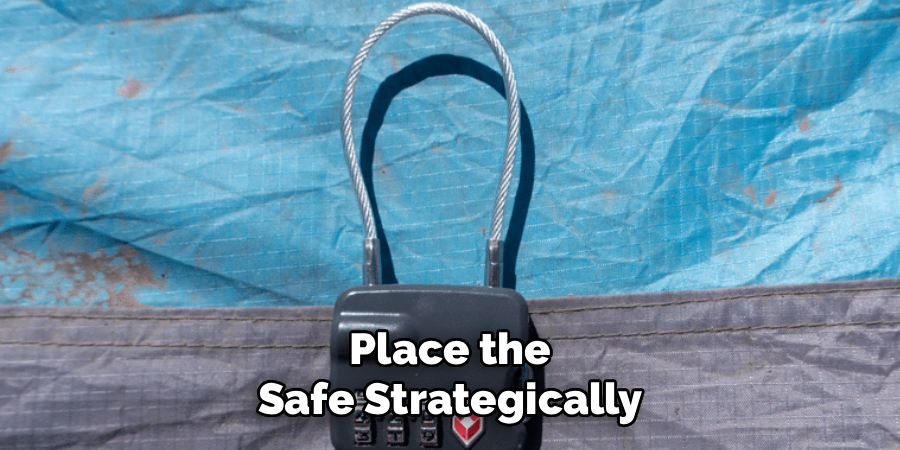
Place the safe strategically within the tent, such as under your sleeping bag or among other gear. Combining a secured tent with a portable safe creates a multi-layered approach to camping security, guarding against both external and internal risks.
Step 9: Remain Alert and Vigilant
Even with a locked tent, staying alert to your surroundings is important. Monitor nearby activity and trust your instincts—if someone seems overly curious about your tent or belongings, take note of their behavior. Building rapport with fellow campers can also foster a sense of community and shared security.
Remaining vigilant ensures that your locking efforts are complemented by situational awareness and allows you to address concerns early if any issues arise. Staying proactive throughout your camping trip supports a worry-free experience.
Common Security Mistakes
One of the most common security mistakes is underestimating the importance of properly securing valuables. Many campers leave items like wallets, keys, or electronics in easily accessible places, which can attract opportunistic thieves. Another frequent error is neglecting the use of sturdy locks or reliable security measures for tents and storage.
Additionally, some campers overlook the importance of vigilance, becoming too relaxed and failing to notice suspicious activity. Sharing too much information about your plans with strangers can also compromise security, as it may reveal when your campsite will be unattended. Being aware of these common mistakes and taking steps to avoid them can significantly enhance your overall safety and peace of mind during your trip.
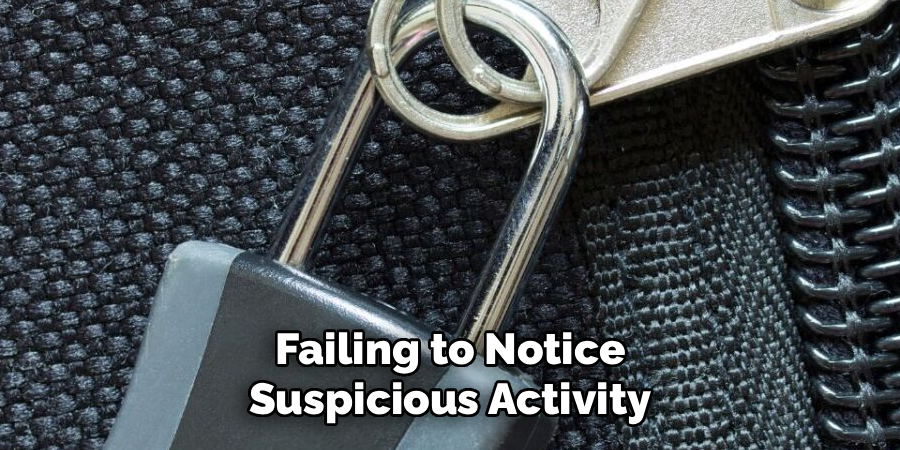
FAQFrequently Asked Questions
Can a locked tent really stop theft?
While a locked tent isn’t foolproof, it serves as a deterrent by making unauthorized access more challenging. Combined with good camping habits and secure storage, it significantly reduces the chances of theft.
What locks are best for securing a tent?
Zipper locks, small padlocks, or combination locks are excellent for securing tents. Choose weather-resistant options to ensure they perform well in outdoor conditions, especially against rain or moisture.
Will locking a tent keep animals out?
Although a lock can prevent wildlife from easily entering, securing food and using wildlife-deterrent measures are equally important. Locking your tent is just one part of managing animal safety.
Are portable safes worth using inside tents?
Yes, portable safes provide additional protection for high-value items, particularly when camping in public or unsecured locations. They complement tent locks for a multi-layered security approach.
Should I lock my tent in secluded areas?
Even in remote locations, locking your tent is a good habit. It helps prevent unexpected wildlife encounters and gives you peace of mind while exploring or sleeping outdoors.
Conclusion
While no security measure can guarantee complete protection, taking small, thoughtful steps can significantly reduce risks during your camping trip. Combining strategies like using a portable safe, locking your tent, and staying vigilant ensures a more secure and enjoyable experience.
Always remember to assess your surroundings carefully and adapt your security approach as needed to suit the environment. A little preparation goes a long way in protecting both your belongings and your peace of mind.
Knowing how to lock tent is a vital skill for any camper aiming to protect their belongings and enjoy a stress-free outdoor experience. By following these steps—choosing the right lock, securing zippers, and adopting good storage habits—you can maximize your tent’s security.
A locked tent not only deters theft but also safeguards your personal space and belongings, contributing to a worry-free trip. Try these techniques on your next adventure, and camping security will no longer be a concern—just pure enjoyment of nature awaits!

